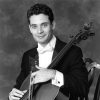
Stage-dreaming
Mickey Katz
A few days ago I was on the Symphony Hall stage, playing Brahms’s A German Requiem in concert. While playing the second movement, I started thinking about what I was going to make for dinner the following night. The last time I cooked it, I thought, it came out a little dry. Maybe this time I should…
But wait a second, I was playing one of my favorite pieces in one of the world’s best halls, with a great orchestra and a great conductor, how could I not be completely absorbed in what I was doing? Was I the only one on stage whose mind was wandering, and if not—did anyone in the audience notice? I was aware that I was a part of a great concert, and the audience seemed to think so too. What was going on? I was playing everything just fine, but I wasn’t really there, and becoming aware of it made me feel like I’m not doing what I’m supposed to.
We try very hard to be “in the zone” when we perform, but is it really realistic to expect ourselves to always be there? In a professional setting you have to perform a lot. This year, for example, I will have played about 170 concerts with the orchestra, plus a good number of chamber music concerts. As much as I can try, it’s certain that I won’t be as involved as I’d like to in quite a few of them. So how do we as performers deal with that?
For one thing, we shouldn’t take it too hard when it happens. We all know how easy it is to start beating ourselves up for being distracted, and as a result get more and more distracted. Better to just acknowledge what’s happening without judgment and just go on.
More important is the matter of how we prepare and practice. Young cellists often practice their notes carefully, and expect the inspiration of the moment to take care of the rest. We simply cannot rely on that—we owe it to our audience to give the music the expression we want to give it whether or not we’re “feeling it” at the moment. When we practice, we should be aware of the expression we want to show in the music, and be specific about how we achieve it with our instrument. This is where technique meets musicianship and where it matters most.
So don’t worry about being out of the zone sometime, I would bet that it happens even to the best of us. But do work on making that variable matter as little as possible by knowing exactly what you want to say musically and how to make it happen technically. If anything, it will make the times when you are fully present and fully involved in what you’re doing even more satisfying and memorable.
Subjects: Artistic Vision, Orchestra
